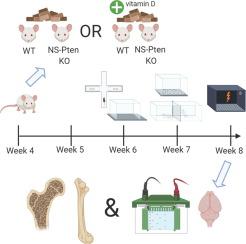Epilepsy & Behavior ( IF 2.3 ) Pub Date : 2021-09-10 , DOI: 10.1016/j.yebeh.2021.108297 Paige D Womble 1 , Samantha L Hodges 2 , Suzanne O Nolan 1 , Matthew S Binder 1 , Andrew J Holley 1 , Rebecca Herrera 1 , Savannah Senger 1 , Eliesse Kwok 1 , David A Narviaz 1 , Amanda Faust 1 , Christian J Hernandez-Zegada 1 , Ronald Y Kwon 3 , Joaquin N Lugo 4

|
Individuals who experience recurrent spontaneous seizures often show behavioral and physiological comorbidities. Those with epilepsy are at a high risk of bone fractures (independent of seizure-related falls) and show a higher rate of a diagnosis of Autism Spectrum Disorder. The neural subset-specific (NS) Pten knockout (KO) mouse has an epilepsy phenotype, has been characterized to show autistic-like deficits, and has an osteoporosis phenotype. The current study examined the effect of a vitamin D enriched diet (20,000 IU VD) in the NS-Pten KO and wildtype mice. Mice were placed onto a vitamin D enriched diet at 4 weeks of age and maintained on that diet throughout testing. Behavioral testing began at 6 weeks of age and included tests for general activity, anxiety, repetitive behaviors, social behaviors, and memory. Results indicated that a vitamin D diet attenuated hypoactivity levels in male KO mice (p < 0.05). In a social partition task, vitamin D increased sociability in male wildtype mice, (p < 0.05). Most significantly, vitamin D fortified diet increased percent survival in KO animals and decreased the level of microglia marker IBA-1 and mTOR (mammalian target of rapamycin) downstream targets pS6 and pAKT. A high vitamin D diet did not reverse bone deficits in male or female KO mice. Overall, these findings suggest that a vitamin D enriched diet had a significant impact on the behavioral phenotype of NS-Pten KO mice, suggesting that dietary manipulations could be a potential therapeutic option for autistic-like behavior.
中文翻译:

富含维生素 D 的饮食可减轻皮质发育不良小鼠模型中性别特异性行为缺陷、延长寿命,但不能挽救骨骼异常
经历反复自发性癫痫发作的个体通常表现出行为和生理合并症。癫痫患者骨折的风险很高(与癫痫相关的跌倒无关),并且自闭症谱系障碍的诊断率较高。神经亚群特异性 (NS) Pten敲除 (KO) 小鼠具有癫痫表型,已被表征为显示出类似自闭症的缺陷,并且具有骨质疏松症表型。目前的研究检验了富含维生素 D 的饮食(20,000 IU VD)对 NS- Pten KO 和野生型小鼠的影响。小鼠在 4 周龄时被喂食富含维生素 D 的饮食,并在整个测试过程中维持这种饮食。行为测试从 6 周龄开始,包括一般活动、焦虑、重复行为、社交行为和记忆的测试。结果表明,维生素 D 饮食可减轻雄性 KO 小鼠的活动减退水平 ( p < 0.05)。在社交分区任务中,维生素 D 增加了雄性野生型小鼠的社交能力( p < 0.05)。最重要的是,维生素 D 强化饮食增加了 KO 动物的存活率,并降低了小胶质细胞标记物 IBA-1 和 mTOR(雷帕霉素的哺乳动物靶标)下游靶标 pS6 和 pAKT 的水平。高维生素 D 饮食并不能逆转雄性或雌性 KO 小鼠的骨骼缺陷。总的来说,这些发现表明富含维生素 D 的饮食对 NS- Pten KO 小鼠的行为表型有显着影响,这表明饮食控制可能是治疗自闭症样行为的潜在治疗选择。











































 京公网安备 11010802027423号
京公网安备 11010802027423号